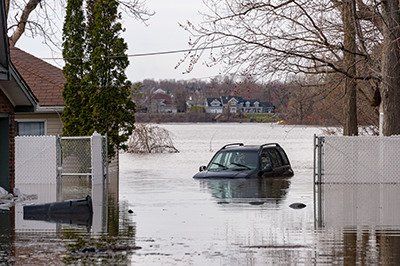Do not be the person who, once the chaos of a catastrophe strikes, looks back and says: “I was not prepared for this.”
Earlier this year, we shared an article discussing how your estate plan can be an effective tool for managing some of the chaotic life changes that inevitably creep their way into your life. Some changes are good. Some are bad. And some just must be dealt with. But whatever the changes are that confront you, your estate plan can be a useful resource not just to respond to unexpected change in your life, but to prepare for it — and even to use it to your long-term financial advantage.
This is the first in a series of monthly articles that will share with you different estate planning insights on “controlling the chaos.” In this article, we will address some of the ways that your life can be affected by unexpected catastrophic injury or illness and how you can adjust your estate plan to prepare for it.
How can I plan for what is unexpected?
We have all heard the tongue-in-cheek phrase: “Nothing is certain except death and taxes.” Well, when it comes to estate planning, there may be more truth to this statement than sarcasm. The reason it is so important to have a comprehensive estate plan that accomplishes your financial goals for you and your family, especially upon your death, is that death is inevitable. Not a single person on the planet is going to avoid it. And so we plan. No one knows when death will come or the manner in which it will call us, but we plan. We plan because we expect the unexpected.
What is a catastrophic event?
When most people think of a catastrophic event, they think:
- Hurricane - The deadliest hurricane in U.S. history was the Great Galveston Storm of 1900. It killed 8,000 people.
- Earthquake - The deadliest earthquake occurred in San Francisco, California, on April 18, 1906. It killed approximately 3,000 people.
- Flood - The deadliest flood in U.S. history was the Johnstown Flood of 1889 in Pennsylvania. It killed an estimated 2,209 people.
- Tornado - The deadliest tornado in U.S. history was the Tri-State Tornado, which tore through Missouri, Illinois and Indiana in 1925, killing 695 people.
What do these events have in common that make them catastrophic?
- They strike acutely and without warning.
- They are life-threatening.
- They impose significant residual damage.
- They are suddenly and radically life-changing.
- They are financially devastating.
Even with the most advanced and sophisticated warning systems, we cannot avoid these natural disasters. And although the likelihood of experiencing a natural catastrophe may be relatively low, nations and families spend billions of dollars and thousands of hours a year preparing for them.
What is a catastrophic injury or illness?
According to Medical Dictionary, a catastrophic injury or illness is defined as an “acute or prolonged (injury or illness) usually considered to be life-threatening or with the threat of serious residual disability. Treatment may be radical and is frequently costly.”
The following are typically considered catastrophic illnesses:
- Cancer - In the United States, in 2019, more than 600,000 people died from cancer. Lung cancer, alone, killed nearly 150,000 people — three times as many who died from the second most common cancer — colon cancer.
- Heart Attack - Cardiovascular disease is the leading cause of death in the U.S. It kills approximately 850,000 people a year.
- Stroke - Every year, about 800,000 people in the U.S. experience a stroke; 150,000 of those will not survive.

The American Medical Association describes a catastrophic injury as a severe injury to the spine, spinal cord, brain or skull. And federal law defines a catastrophic injury as one that “permanently prevents an individual from performing any gainful work.”
- Spinal Cord Injuries - According to the National Spinal Cord Injury Statistical Center, 363,000 people in the U.S. are living with a spinal cord injury. The average age at the time of injury is 43. Approximately 77% of people with spinal cord injuries are unemployed 10 years after their injury.
- Brain Trauma - According to the Center for Neuro Skills, every year, from traumatic brain injury, there are: 56,000 deaths (153 per day); 282,000 hospitalizations (773 per day); and 2,500,000 emergency department visits (6,849 per day).
-
Other sources may include as common catastrophic injuries:
- severe burns
- accidental amputation
- multiple bone fracture
- eye injury
- organ damage
- neurological disorder with paralysis or paraplegia/quadriplegia
These life-threatening injuries and illnesses also strike acutely and without warning. They cause considerable and radically life-changing residual damage for family members and loved ones who have to care for the victims — often for the rest of their lives. Coupled with a complete loss of employment, the cost to one family from these catastrophic events can be astronomical — in the millions.
Even more perplexing is that there are millions more people killed and injured by catastrophic accidents and illnesses than by natural disasters, yet in a 2019 study, although more than 75 percent of people felt that having an estate plan was important, only 40 percent actually had a plan.
Planning for catastrophic injury or illness
Catastrophic injuries and illnesses are physically, financially and emotionally devastating to the victims and their families. They could result in the need for a lifetime of long-term care or assistance, rehabilitation and medical bills.
Unless you are extremely wealthy or can predict the future to know when it is coming, most people cannot incur the cost of a catastrophic injury or illness, especially when they occur to children and young- and middle-aged adults, who may face a lifetime of dependency and medical costs. To prepare for the unexpected catastrophic injury or illness, and to protect yourself or your family from financial devastation if or when they occur, you must rely on effective forward-looking estate planning.

Your estate planning attorney will discuss with you the variety of estate planning resources that can help you to assess your risk for catastrophic injury or illness and reevaluate your plan to balance those risks with the most responsible and appropriate plan for you and your family. Your estate planner may discuss with you resources like:
- Catastrophic insurance - Your estate planner can help you find the most affordable plan with maximum coverage to accommodate your needs.
- Employer health plans - Employer health plans may cover spouses and dependents notwithstanding previous health histories.
- Medicare and Medicaid eligibility - Your estate planner can determine whether you qualify for federal benefits that may cover some of the cost of long-term catastrophic care.
- Spend-down - If long-term care is anticipated, your estate planning attorney can discuss with you appropriate gift and asset allocations that may qualify you for long-term coverage without consuming your life savings.
- Tax strategies and advantages - Your attorney can evaluate your tax position and assess what tax strategies may provide you the most advantageous plan for absorbing the cost of disabling injuries or illnesses.
- Retirement savings - Retirement allows you to use the savings you have earned from decades of employment to enjoy the remainder of your life — hopefully in health. But with retirement may come declining health and an increased risk of catastrophic injury or illness. Although often advised to be used as a last resort, if your retirement is affected by long-term care resulting from a catastrophic medical event, your estate planner can help you determine the most prudent use of your retirement savings to accommodate your medical needs.
A forward-looking perspective on planning for catastrophic injury and illness
Too often, we watch catastrophic events unfold and we shudder at the loss and devastation imposed on all who are subjected to it:
- Lives altered
- Family-life disrupted
- Financial savings destroyed
- Future plans ruined
- Assistance needed
Consider whether these consequences more accurately describe:
- A hurricane or cancer
- An earthquake or a stroke
- A flood or a severed spinal cord
- A tornado or traumatic brain injury
As between the former of these and the latter:
- Which are you more likely to experience?
- For which is it most prudent to prepare?
To minimize the family and financial chaos of a catastrophic medical event, look now, into your future, from your current perspective on life, and resolve to plan ahead. Expect the unexpected.
If your estate plan does not anticipate a catastrophic injury or illness for you or your family, your estate planning attorney can discuss the estate planning options that are available to you.



